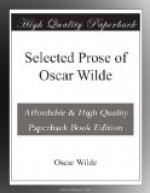THE TWO SUPREME AND HIGHEST ARTS
Life and Literature, life and the perfect expression of life. The principles of the former, as laid down by the Greeks, we may not realise in an age so marred by false ideals as our own. The principles of the latter, as they laid them down, are, in many cases, so subtle that we can hardly understand them. Recognising that the most perfect art is that which most fully mirrors man in all his infinite variety, they elaborated the criticism of language, considered in the light of the mere material of that art, to a point to which we, with our accentual system of reasonable or emotional emphasis, can barely if at all attain; studying, for instance, the metrical movements of a prose as scientifically as a modern musician studies harmony and counterpoint, and, I need hardly say, with much keener aesthetic instinct. In this they were right, as they were right in all things. Since the introduction of printing, and the fatal development of the habit of reading amongst the middle and lower classes of this country, there has been a tendency in literature to appeal more and more to the eye, and less and less to the ear which is really the sense which, from the standpoint of pure art, it should seek to please, and by whose canons of pleasure it should abide always. Even the work of Mr. Pater, who is, on the whole, the most perfect master of English prose now creating amongst us, is often far more like a piece of mosaic than a passage in music, and seems, here and there, to lack the true rhythmical life of words and the fine freedom and richness of effect that such rhythmical life produces. We, in fact, have made writing a definite mode of composition, and have treated it as a form of elaborate design. The Greeks, upon the other hand, regarded writing simply as a method of chronicling. Their test was always the spoken word in its musical and metrical relations. The voice was the medium, and the ear the critic. I have sometimes thought that the story of Homer’s blindness might be really an artistic myth, created in critical days, and serving to remind us, not merely that the great




